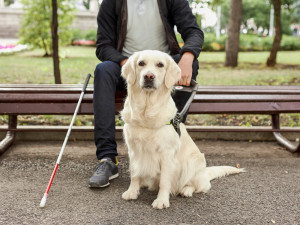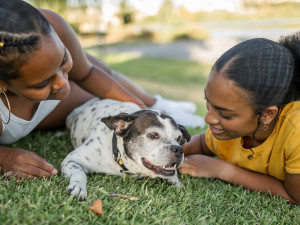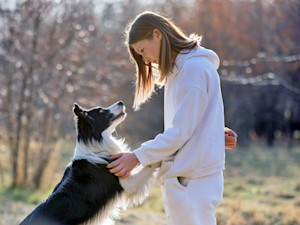Service Dogs Can Ease Veterans’ PTSD and Anxiety, Studies Say
Trained service dogs can sense panic attacks, wake veterans from nightmares, and give all the healing cuddles.

Share Article
It’s Veteran’s Day, which means it’s a great day to celebrate the service dogs who improve their lives. Research has found that for vets, it’s hard to overstate how helpful a canine companion can be. One 2021 studyopens in new tab found that service dogs help decrease post-traumatic stress disorder (PTSD) in veterans. In the report following the study, the VA said that veterans paired with service dogs showed improved mental health and fewer signs of suicidal ideation.
A 2020 study from Frontiers in Psychologyopens in new tab determined that of all the tasks service dogs can be trained to do, their ability to ease veterans’ anxiety was the most valuable — and the most often used. Unlike pet dogs, service dogs are specially trained to identify and disrupt anxious episodes.
“There has been some debate on what kind of training PTSD service dogs need to be effective and how their assistance may be different than what a pet dog can provide,” Kerri Rodriguez, a human-animal interaction graduate student at Purdue University and lead author of the study, says. “This study suggests that veterans are, in fact, using and benefiting from the specific trained tasks, which sets these dogs apart from pet dogs or emotional support dogs.”
How service dogs keep PTSD anxiety in check
The study surveyed 216 veterans, including 134 with a service dog and 82 on a waitlist. The veterans rated all of the service dogs’ trained tasks as “moderately” to “quite a bit” important in aiding their PTSD, including their ability to notice the veterans’ nightmares and wake them up, as well as their training to look the opposite way in a crowded room or store, which provides veterans with a sense of security.

Researchers found the service dogs’ training to detect increasing anxiety in veterans and provide physical contact (in the form of pawing, nudging, or licking during episodes) to be the most important and most frequently used in a typical day.
Why the human-dog bond is important
Service dogs will always act on their trained cues, but a bond between them and the veterans proved to provide even more relief. In fact, veterans in the study who had a service dog rated the importance of the pups’ untrained behaviors even higher than the importance of their trained tasks.
This suggests that there are therapeutic aspects of the service dogs’ companionship that help just as much, if not more, than their trained tasks, Rodriguez says. “These service dogs offer valuable companionship, provide joy and happiness, and add structure and routine to veterans’ lives that are likely very important for veterans’ PTSD.”
Why additional research and PTSD treatment options are needed
Unfortunately, service dogs aren’t a cure-all. Although veterans with PTSD who have them see a decrease in flashbacks, nightmares, and being hyper-aware in public, many still frequently struggle with risk-taking and amnesia.
“Both this research, as well as other related studies on PTSD service dogs, suggest that service dogs are not a standalone cure for PTSD,” says Maggie O’Haire, associate professor of human-animal interaction. “Rather, there appear to be specific areas of veterans’ lives that a PTSD service dog can help as a complementary intervention to other evidence-based treatments.”
During the study, veterans on the waitlist to receive a service dog had understandably higher expectations for treatment than those who already had one, likely due to feelings of hope and excitement, “which may not necessarily be a bad thing,” says Rodriquez. “However, it is important for mental health professionals to encourage realistic expectations to veterans who are considering getting a PTSD service dog of their own.”
Republished with permission under the CC BY 4.0 licenseopens in new tab, courtesy futurity.orgopens in new tab. May be edited for style and length. Source: Purdue Universityopens in new tab. DOI: 10.3389/fpsyg.2020.01638
Abbey Nickel
Abbey Nickel is a writer for Purdue University, a top public research institution developing practical solutions to today’s toughest challenges.
Related articles
![Unrecognizable man sitting on a park bench with his service dog]()
What is the Difference Between Service Dogs and Therapy Dogs?
Both are perfect angels, to be clear.
![Person holding a corgi, shot from behind]()
Flying with An Emotional Support Animal
Are ESA alpacas and peacocks mocking people with real disorders? A service-dog owner and flight attendant get real.
![Two Black women with curly hair laying on the grass with their senior dog laying between them]()
Therapy Dogs Can Help You With Your ADHD
Happy news: Pups can help support your (or your kid’s) everyday needs.
![Service dog kicked off plane]()
Family Kicked off Flight Because of Daughter's Seizure-Sensing Service Dog
“What they did was horrific to us.”
![Valentin Pujadas illustration]()
FYI, Pets Are Incredibly Good For Your Mental Health
Experts share the science-backed ways our pets offer us emotional support.
![Woman looking at her dog intently outside.]()
Dog Senses Stranger’s Seizure 40 Minutes Before It Occurs—How Is This Possible?
This dog wasn’t even trained to do this, but many are.






